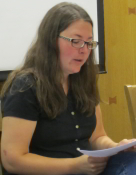- Campuses :
- Twin Cities
- Crookston
- Duluth
- Morris
- Rochester
- Other Locations

center for writing
mwp.umn.edu
Elisabeth Charboneau
©2013
 The End of the World
The End of the World
“Es-tu prête pour l’exercice de confinement aujourd’hui?” one of the friendlier teachers asked me. I was standing in line at the copier in the teachers’ lounge early one morning, listening to the chatter of students gathering outside in the school yard. I had heard this term, exercice de confinement, tossed around a few times by teachers at the lunch table, but I knew that the drill was taking place in the morning during one of my breaks between teaching classes, so I wasn’t too concerned.
“Yes, I think I’m ready,” I replied succinctly in French. Even though I had worked in France for several months, I still sometimes struggled to string together the words to make long sentences, especially with people I didn’t know well.
After my first class, I went back to the teachers’ lounge to work on my next lesson plan. The room was empty except for me. Most teachers either had a class at the time or had already left to go home for lunch. I walked over to the coffee vending machine and put thirty-five cents in the slot, which bought me a small sweetened espresso shot, no larger than a Dixie cup. I blew on the espresso and settled onto the red upholstered couch. As I was pulling out my work, I jumped a few inches as the piercing shriek of a fire alarm filled the room. I looked outside to the cement school yard where the students line up each morning, but I didn’t see anyone evacuating the building. “This must be the confinement exercise,” I thought. I decided to stay where I was until told to do otherwise.
A half an hour later, I heard someone come to the door. Suddenly a man and a woman in uniform entered the room. They seemed surprised to see me calmly sitting on the couch. “What are you doing here? How long have you been here?” the woman accused. My heart started racing. I had no idea this was an official inspection.
Not sure what the right answer was, I decided on the truth. “I’ve been here for a half an hour. I thought . . . I thought I was supposed to stay here,” I replied feebly, tripping over my words in French. I nervously played with the empty plastic cup in my hand, crunching the sides together until they popped back out with a loud crack.
As soon as I spoke, a knowing look appeared on the woman’s face. “Are you English?” the woman asked more slowly. Although she was trying to be friendly, I couldn’t bring myself to meet her eyes.
My face felt like it was on fire. “No, I’m American. I’m the English language assistant.”
“Did you know there was a confinement exercise happening?” the woman continued, barely waiting for my nod. “You can’t be in a room like this. If there were a major disaster, there are too many windows. You should come with us now to the seclusion zone.”
I followed them downstairs sheepishly, wondering what would happen next. I had never been sent to the principal’s office when I was a student; would I now be escorted there as an adult? Instead, they led me into a classroom on the ground floor where there were no windows. The students were sitting around the tables calmly playing hangman in French. My thoughts quickly went to the worst-case scenario: would everyone know that I was the one person in the whole school who hadn’t followed the rules? I fought back tears, trying to stay professional, but I could tell that my bright red cheeks were betraying me.
***
For the rest of that day, I was mortified, but I now realize my mistake was caused by a simple cultural misunderstanding: as an American, I associated the word confinement with the lockdown drills that American schools started conducting routinely after the Columbine shooting.
Later that day, I tried to escape the shame of my blunder by taking a long walk along the beach. I looked out on the open sea. The more I thought about the embarrassment I felt earlier in the day, the faster I walked until I came to the end of the path. There it was—le but du monde, or literally translated, the end of the world. The first time I heard this phrase, I laughed at how dramatic it sounded, but that day I wished I could keep walking past the end of the world, out into the wide expanse of water. If I turned my back on the land, I could imagine myself floating away from the humiliation I felt, rocked by the waves and refreshed by the frigid water.



